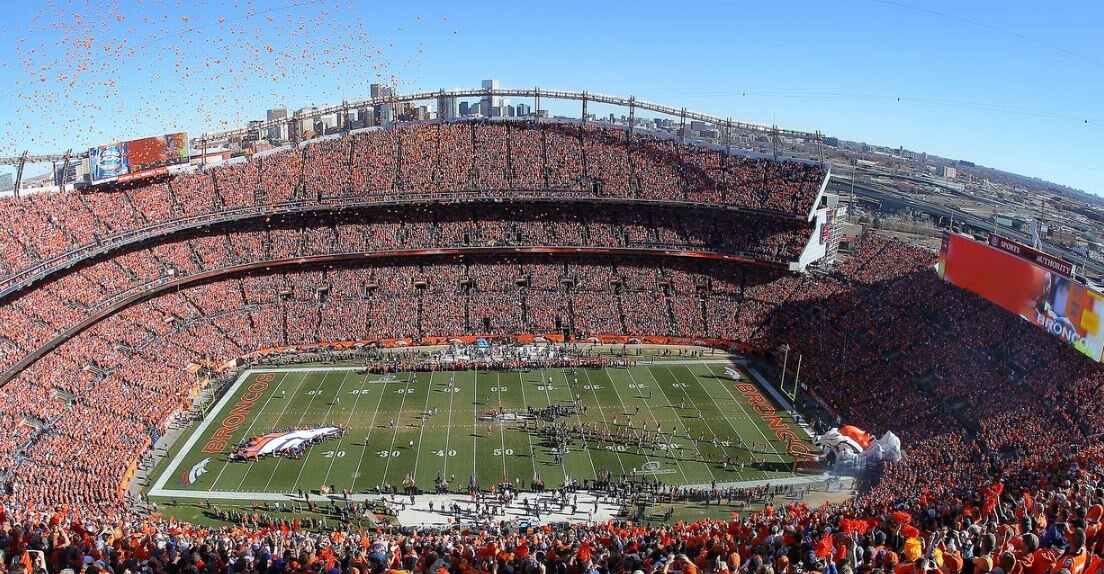Denver is nothing if not full of iconic landmarks—pieces of history that dot its landscape and bring pride to the locals. Empower Field at Mile High, formerly known more simply as “Mile High Stadium,” is steeped in local importance and lore. Sitting just across Federal Boulevard from many of the Denver Developer’s own project sites, it remains a constant reminder of the great city and its past, and also of its growing and burgeoning future.
The History of Mile High
The name itself is playing off the height dynamic the city of Denver sits at, 5,280 feet above sea level. In fact, the current Mile High Stadium was a replacement of an even older one, the original home of the Denver Broncos that was built in 1948 (though it was first built to host baseball games, and was not used for American football until the ‘60s). In early 2000, the stadium body began to be replaced with the iconic look that Empower Field now has. In 2001, the field was open to the public, newly dubbed Invesco Field due to Invesco’s $120 million paid for naming rights. It came complete with a Colorado Sports Hall of Fame and a ring of important Denverite sports players through the years. It remained Invesco Field for ten years, and saw hundreds of games played on the grounds. Outside of the Denver Broncos, rugby groups, lacrosse, world-class celebrities, and monster truck rallies all utilized the stadium for their own events. The stadium has sold out every single Broncos game since 2001, following the streak of the original stadium since 1970. Even today, the “Mile High Thunder” rumbling (from fans’ stamping feet toward the top of the bleachers) can be heard echoing through the nearby Denver urban area.
Its location so close to downtown Denver and right of I-25 has made it a definitive landmark for the city over time, and serves as a great spot for the stadium’s variety of purposes.
In 2011, the Invesco title went and away and was replaced with sponsor Sports Authority’s moniker, which it remained until the companies liquidation near the end of 2016. Over this time, the field gained lots of traction and popularity thanks to the inclusion of star Peyton Manning on the Denver Broncos team. The field’s name changed again in 2018 to simply Broncos Stadium at Mile High, perhaps the most fitting out of all the previous names.
A new corporate negotiation saw Empower Retirement take the name toward the end of 2019, which brings us to the present naming of the field. Fans opposed the name change simply because Mile High Stadium and Broncos Field felt the most appropriate and accurate; nevertheless, the change occurred.
Mile High Today
Usage today varies as much as it did in the past. Upcoming events include Monster Energy Supercross sporting, as well as Justin Bieber’s recent singing tour ‘Changes.’ Marching band finals and even college football rivalries are settled here, and of course the Denver Broncos romp out on the field for every home game in their season. Many visiting pro athletes lament the altitude associated with the city, as it does in fact deal some impact on their performance. Denver Broncos rivals beware.
Bucky the Bronco is displayed proudly on the front of the stadium. He is not the only traditional piece that fans still cling to despite the constant name change. Many of the chants from decades of American football seasons have persisted, including the famous “IN-COM-PLETE” intimidation chant that audiences shout out when the visiting team’s pass fails to meet its mark.
Any time the stadium has hosted Broncos playoff matches, the entire Denver area benefits from the increased revenue streams and visiting fans. More and more individuals are able to see the value of living in Denver after visits such as these, and its thanks to these sorts of visits that Denver is booming as a city today. Mile High Stadium’s popularity truly has not wained.
The Denver Developer blog highlights landmarks such as the Mile High Stadium in order to show how unique and special our town is. As it expands and the real estate market here grows, let’s keep two eyes on the future, but take a moment to give honor to the past. That’s the purpose of this blog post, and all others like it in the future. If you’re here for real estate info and investment opportunities, be sure to check out the Denver Developer’s upcoming projects via our main page, or contact us here for real estate opportunities available today.


